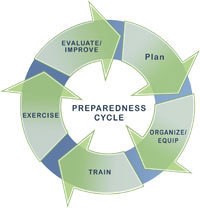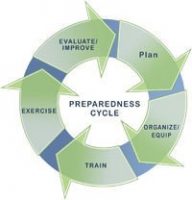September is recognized as National Preparedness Month, which serves as a reminder that we all have a role in preparing, now and throughout the year, for the types of emergencies that could affect us where we live, work, and also where we travel.
We each play a critical role in preparedness. Not just government agencies but all sectors of society – service providers, businesses, civic and volunteer groups, and industry associations – can benefit from planning ahead for emergency response. Only by identifying the risks can we determine the impact or cost of not preparing. EMSI’s cadre of response professionals continues to grow more diverse in their qualifications and backgrounds as we support our clients in real-world events, including preparedness training. But what remains at the core of who we are at EMSI is our depth of experience and the ability to innovatively apply our extensive capabilities to improve our client’s proficiencies within a wide spectrum of circumstances.
Preparedness is defined by DHS/FEMA as “a continuous cycle of planning, organizing, training, equipping, exercising, evaluating, and taking corrective action in an effort to ensure effective coordination during incident response.” Such preparedness skills can only be developed through the efforts of planning, training, and exercising. A core mission of EMSI is to enhance response capabilities across the broad spectrum of responders in every organization and level while preparing those responders for an incident, assisting your organization through training, response, exercises, or preparedness.
Today, we are keenly aware that no organization can function without a strong preparedness capability and that capability is crucial to an organization’s resilience and recovery from an incident. What are the impacts to your organization if you are not prepared? The reality is that bad things happen and we must be ready to respond. How you respond could be the difference between whether your organization exists at the end of a response. For this reason, preparedness is critical.
The Preparedness Cycle
Historically, emergency management has primarily drawn upon the fields of emergency medicine, fire fighting, and law enforcement for many of its foundations. Developed over time through the trials and tribulations of real-world events, a systematic approach to preparedness has evolved for emergency management as a whole, and in particular to defining the steps necessary for effective program management.

Figure 1 depicts an international industry and government best practice preparedness planning process. This cycle illustrates the way that response plans are continuously evaluated and improved through a progression of planning, organizing, training, equipping, exercising, evaluating, and taking corrective action. EMSI’s cadre has years of experience with this preparedness cycle, to include qualified Master Exercise Practitioners, which can help develop your organization’s cycles.
Although the preparedness cycle is continuous, there is a logical starting point as explained below:
• It starts with the identification of a need for emergency preparedness and response planning.
• Once this need has been identified, plans are developed, and those entities having roles and responsibilities prescribed in the plan are organized and trained on the plan.
• When this training is complete, the plan is then exercised to evaluate not only this training but also the effectiveness of the plan in meeting the need that was identified at the beginning of the preparedness cycle.
• After the exercise, the plan is evaluated and improved and the preparedness cycle starts over.
A key element of preparedness is the quest for continuous improvement. The cyclical nature of this system is fundamental to defining and applying the successive steps to be taken after determining whether a jurisdiction, or any type of entity, is or is not prepared. EMSI’s response experts stand ready to assist in preparing your organization’s lessons learned to enable you to be better prepared for real-world incidents. Regardless of whether these standards are met, agencies and organizations must re-examine their plans regularly, as both natural and technological threats continuously evolve. As Donald Rumsfeld so eloquently put it, “you go to war with the army you have, not the army you might want or wish to have at a later time.” For this reason, preparation is critical to any response.
Another key is the buy-in of preparedness by senior leaders and the development of a preparedness corporate culture whereby all potentially affected members believe they have a vested interest in being prepared for the worst. The ideal time to find gaps is not when an incident has occurred, but in advance, so we can be ready to respond. To assist in the development of senior management, EMSI’s cadre can provide executive-level training and coach participants through exercises to help them develop decision-making strategies and facilitate the use of tools such as the Incident Command System. Using a systems approach can help to ensure that the overall emergency management system is prepared and that each organizational functional areas are prepared as well.
So where are you on your preparedness cycle? Do you have a plan? Have you organized your intended response? Have you trained your personnel on the response and their roles? Did you exercise the plan to identify any gaps? Did you honestly evaluate your preparedness and work to fix any identified gaps?
EMSI’s Preparedness Training
Comprised of national and international all-risk, all-hazard response experts, EMSI’s seasoned cadre gives us a unique background and perspective in dealing with incident and responder needs at every level of government and industry, including the international community. Since its inception in 2000, EMSI has played a major role in helping government and industry clients alike, prepare, train, and respond to emergencies of any cause or size. EMSI has proven experience in helping various local, state, national, international, and private sector entities with their incident management and emergency management programs, including preparedness planning, exercise development and evaluation, and training on the Incident Command System (ICS).
EMSI is committed to providing expert services across the incident management and emergency management spectrum to further our clients’ preparedness to respond. Contact us today to find out how we can help your organization prepare for planned and unexpected events in your world.


